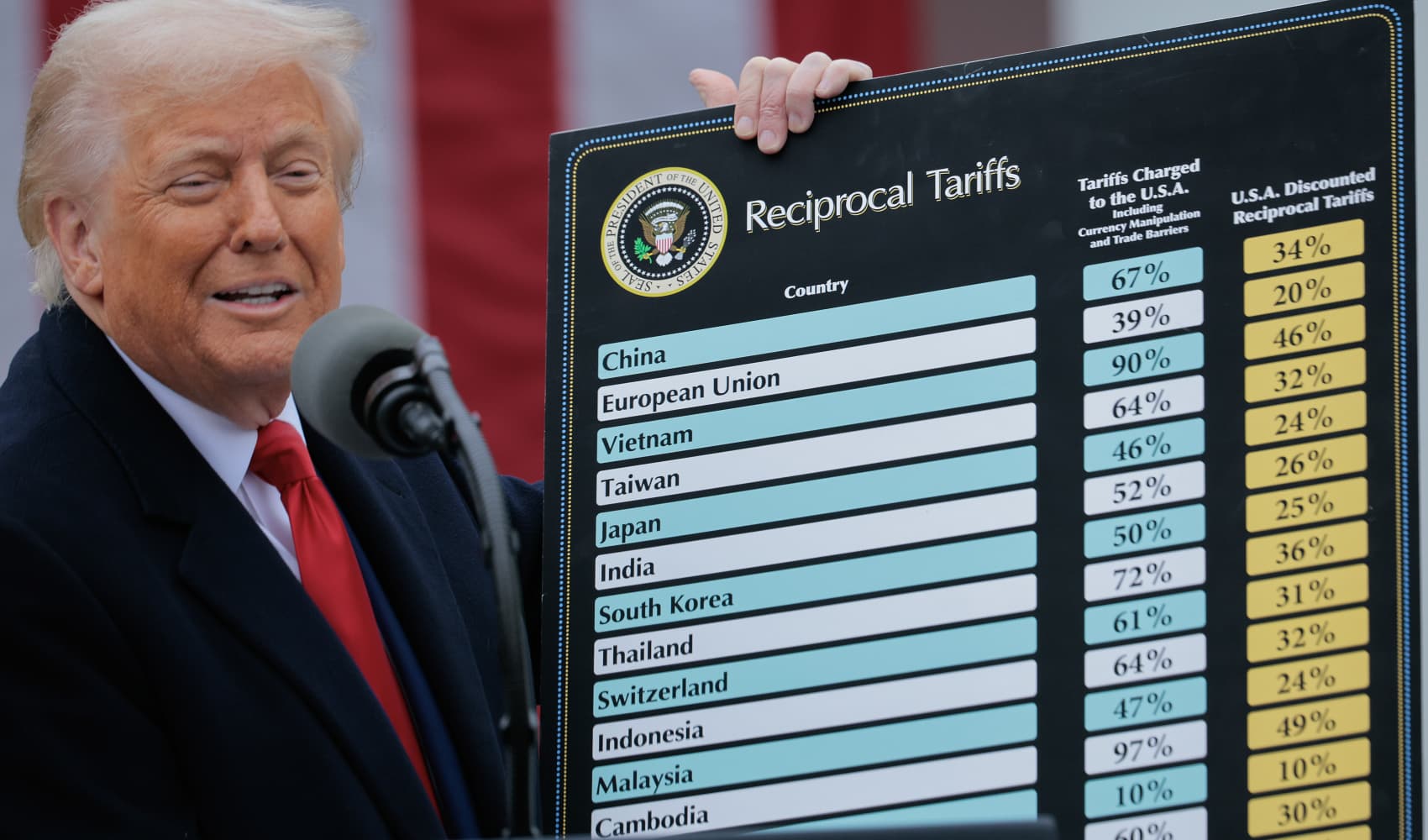
U.S. President Donald Trump speaks to reporters aboard Air Force One on his return to Washington, D.C., U.S., March 30, 2025.
- Stock futures fell amid trepidation about President Donald Trump's tariff plans.
- Trump said he will levy reciprocal tariffs on all nations, not just those with the biggest trade surpluses with the U.S., and told NBC News he "couldn't care less" if automakers raise prices on foreign-made cars.
- Meanwhile, Canadians are taking fewer trips to the U.S. amid Trump's trade war and concerns about traveler safety.
Here are the most important news items that investors need to start their trading day:
1. Trade turbulence
We've got the news you need to know to start your day. Sign up for the First & 4Most morning newsletter — delivered to your inbox daily. Sign up here.
Stock futures slid Monday as investors awaited word on President Donald Trump's next moves in his global trade war. Trump has threatened widespread new tariffs starting Wednesday – though it's still unclear which countries he plans to target, and at what rate. Constant confusion around U.S. tariff policy, retaliatory actions by key trading partners and broader concerns about an economic slowdown have hammered U.S. stocks this month. The S&P 500 has dropped 6.3% so far in March, while the Dow Jones Industrial Average and Nasdaq Composite have fallen 5.2% and 8.1%, respectively. Along with potential tariff clarity, investors will also get critical economic data this week in the March jobs report, which is due Friday. Follow live market updates.
2. 'Couldn't care less'
Trump's wave of fresh tariffs Wednesday, which he has dubbed "Liberation Day," raises the prospect of higher costs for consumers and an economic slowdown. In a note published Sunday, Goldman Sach said "we continue to believe the risk from April 2 tariffs is greater than many market participants have previously assumed." Trump on Sunday said his reciprocal tariff plan would target all countries that levy duties on American-made goods – not just the nations with the biggest trade surpluses with the U.S., as some of his advisors have suggested. Trump has already announced 25% tariffs on all cars not made in the U.S. In an NBC News interview over the weekend, he said he "couldn't care less" if those duties raise prices for foreign-made cars.
3. No-birds

Canadians are cutting back on travel to the U.S. A rise in nationalism in response to Trump's tariffs and threats to annex the northern U.S. neighbor, along with an unfavorable exchange rate and detainments of people who had visas to be in the U.S., have all dampened demand for Canadian trips south. While Canadians account for the largest share of foreign travelers to the U.S., air travel and land crossings were both down in February after Trump took office.
4. Rebranding DEI

As Trump tries to punish companies, universities and other institutions for their diversity, equity and inclusion efforts, many businesses are renaming their programs to avoid scrutiny, rather than giving up entirely. Those efforts to promote representation of marginalized groups in hiring gained traction for years before Republicans made the term DEI a political target. But since Trump signed an executive order banning DEI in the government and ordering scrutiny of private companies, some businesses have simply rebranded. Google, for instance, changed the title of Chief Diversity Officer Melonie Parker to vice president of Googler engagement.
Money Report
5. Final bore
Sports fans who come to March Madness looking for a Cinderella story will have to wait until next year. In the men's NCAA basketball tournament, all four No. 1 seeds (Auburn, Duke, Florida and Houston) made the Final Four for the first time since 2008 and only the second time ever. The national semifinals aren't yet set on the women's side, but already two No. 1 seeds (South Carolina and UCLA) have qualified. The No. 2 seed considered most likely to advance in the women's bracket? Eleven-time champion Connecticut. Despite the predictable results, men's March Madness TV ratings reportedly jumped from last year in the early rounds, while women's viewership dipped from last year's blowout levels but was still higher than in previous tournaments. The women's tournament continues Monday night on Walt Disney's ESPN, while the men's Final Four tips off Saturday on Paramount Global's CBS.
– CNBC's Brian Evans, Lisa Kailai Han, Jeff Cox, Leslie Josephs, Jennifer Elias and Annie Palmer contributed to this report.






